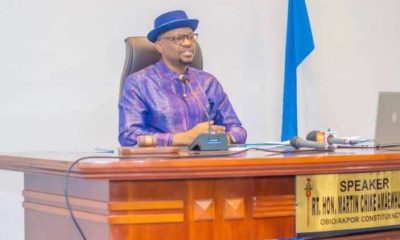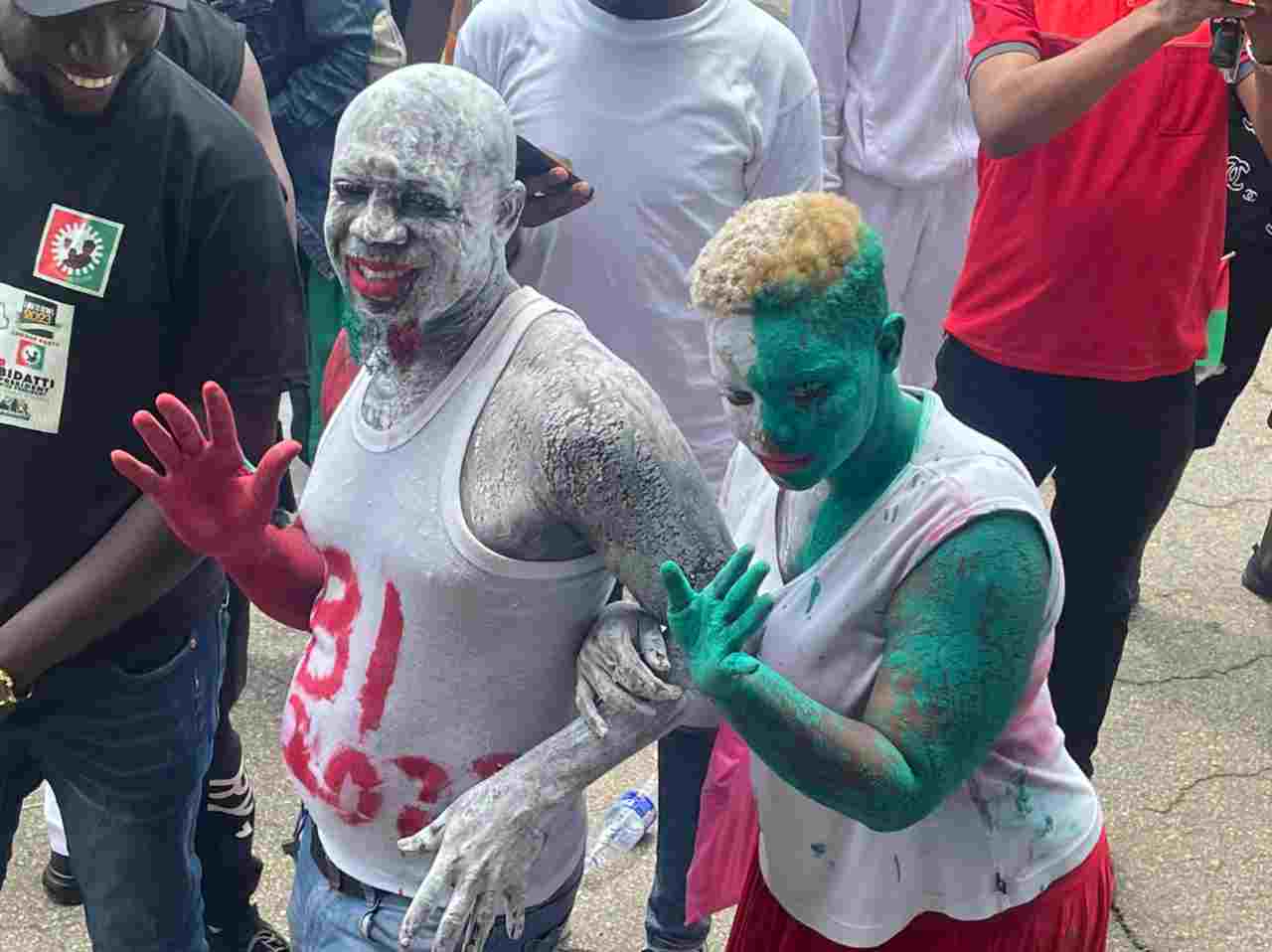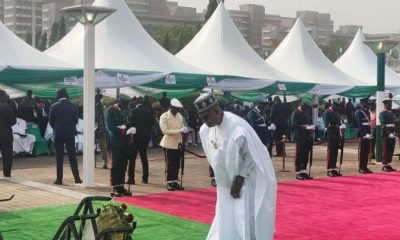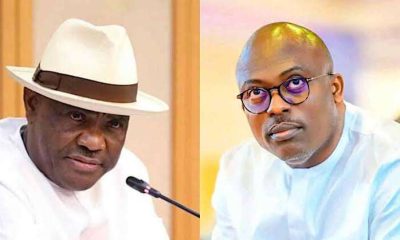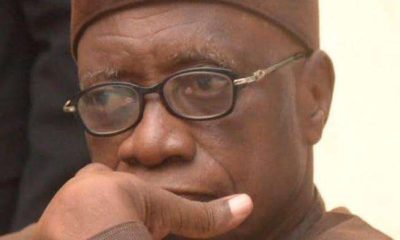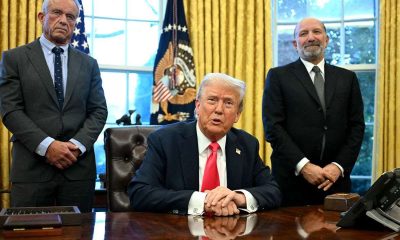Interview
No force on earth can stop Nigeria from collapsing! – Akogun Tola Adeniyi (Part II)

Last week, we published the first part of this explosive interview with Akogun Tola Adeniyi, veteran columnist, author and former Managing Director of the Daily Times of Nigeria, in which he argued that Nigeria as a country has no future.
The Jagun Oodua, who sat down with Business Hallmark’s General Manager, Henry Amune, and Senior Correspondent, Obinna Ezugwu, in this second part, argues that there is no democracy in Nigeria, even as he insists that not even the United States practices democracy. He also says that Nigerians should not blame anyone but themselves for their current predicament.
Excerpts:
In the context of what we currently have – democracy – how do you think we can function?
There’s no democracy. That’s just another lie. There’s no democracy in Nigeria, and there’s no democracy in America. There’s no democracy anywhere. They just pull the wool over our eyes. In America, it’s a government of the rich, by the rich, for the rich. In Nigeria, it’s a mix of plutocracy and cronyism. Think about it. The entire world protested the Vietnam War—millions of Americans demonstrated. Did the government listen? No. Even now, there are protests in Israel over what they’re doing in Gaza. Has the government yielded? No. Is that what we call democracy?
Look at COVID—during that period, if you tuned into news stations in 40 European countries, it was the same narrative. It was all dictated by governments. Now, it’s being revealed that much of it was manipulated. So where is this democracy? The phrase “government of the people, by the people, for the people” never existed in reality. When Plato spoke of it, “the people” didn’t include women, the poor, or non-landowners. Even in the U.S., women only gained the right to vote in the 20th century.
Let’s be honest—to become a senator in Nigeria, you must be a billionaire. Just one campaign billboard costs a fortune, not to mention paying off godfathers, bribing judges, and so on. It’s not a democracy. It’s a system run by elites for their own children and associates. We are ruled by autocrats. Democracy? Where?
The last time we spoke, you addressed the issue of herdsmen. That seems to have worsened. Is there no solution?
There could be a solution, but there’s no political will. Several state governments have banned open grazing, yet it continues—because the police aren’t controlled by the states, they’re controlled by Abuja. And Abuja is unwilling to enforce state laws. When some Americans were kidnapped in Nigeria, the U.S. rescued them overnight. Yet, when Dubai published names of Nigerians financing terrorism, nothing happened—no one was arrested. And when you said they kidnapped Chibok girls, that’s not possible. You don’t kidnap 280 girls without serious logistics—buses, convoy, routes. Where did they vanish to? Into thin air? And they say they hid in Sambisa Forest. There’s no such forest in the savannah. Sambisa is open land. The entire north is visible from the sky. It’s not rainforest like the south. They talk about forests in Katsina or Zamfara. Forests where?
So, are you suggesting there’s more to the Chibok abduction than we were told?
Absolutely. It was highly political. Abacha once said if an insurrection lasts more than 24 hours, the government is involved. At that time, it was all about discrediting Jonathan. Later, governments used the insurgency as a distraction—to say, “We’re facing challenges, don’t focus on our failures.” It gave them cover to continue looting. The insurgents gained momentum, became more daring, and foreign mercenaries got involved — French, German, American. We’ve seen videos of foreign forces dropping weapons for Boko Haram. There are international interests that have never wished Nigeria well.
The herdsmen issue – do you believe it’s purely criminal, or is there another motive?
It’s about land grabbing, nothing else. Policies like Ruga were just strategies to seize land and make foreigners instant Nigerian citizens. We’ve always had herdsmen. Why is it now a crisis? Many of the cattle aren’t even owned by Fulani. David Mark isn’t Fulani, yet he owns herds. There are so many other people, from Niger State and so on. Even the Yoruba have cattle, so it’s not just Fulani or Hausa that have cattle, so they’re just using that as a cover. The “Fulani herdsmen” narrative is a cover. The real agenda is to torment communities, drag them into conflict, and destroy their stability—knowing they have government protection.
You mentioned not wanting to discuss Tinubu directly. But what about his economic policies—fuel subsidy removal, naira devaluation, floating the exchange rate? Were these policies well thought out?
Those policies were dictated by the IMF and World Bank. Full stop. Anything said by any other person doesn’t bother me. They wanted devaluation. They wanted chaos. They wanted the government to become unpopular—maybe even toppled—so Nigeria would be in turmoil. Tinubu was once strongly against subsidy removal. So, how did he do a 180 after becoming president? What changed? You can’t float a currency when you don’t control its trade. Nigeria doesn’t control the dollar. So, how do you throw the naira into open combat with the dollar in a “free market”? That’s economic suicide.
As 2027 approaches, people are already strategizing and forming political alliances. Is there any hope for a positive outcome in the next election?
This country isn’t serious. I opposed the primaries that brought this administration into power. I opposed the 2023 elections, just as I opposed the 1983 election. In 1982, I held a press conference in Ibadan warning against going into another election without resolving the national question.
We still haven’t answered: Do we want to remain one country? If so, how? Under what terms? Do we want to end the quota system? End federal character? Devolve power to regions.
Until we answer those questions, elections are meaningless. Why are we already talking about 2027? That’s the height of un-seriousness. It’s insulting. We just held an election. The government hasn’t performed. Roads are still bad. Schools are in disrepair. Poverty is choking everyone. Yet politicians are already campaigning for another term.
It’s the arrogance of power. People who are not sure that they will wake up tomorrow are talking of 2027.
They’re talking of state capture. Even for us to use that word “state capture” is an insult on ourselves. It’s like someone saying your mother is a fool, and you proudly repeat it. It’s the arrogance of power. We’re saying that somebody has captured Nigeria.
Captured by who? If it’s money that’s being used to capture the system, has that money been given to the over 250 ethnic groups in Nigeria? If they say the judiciary has been compromised, how many people are actually in the judiciary? The entire judiciary has fewer than 3,000 people. The National Assembly? Fewer than 1,000—maybe around 360 in the House of Reps and 109 in the Senate. So, you’re telling me that less than 1,000 people have turned the heads of 230 million Nigerians?
Nigerians have been enslaved, yet they go around cheering their captors. It’s baffling. It’s a very un-serious country. I haven’t seen any people anywhere in the world that behave that way. Not even Ghana, not even Benin Republic, not even Togo, not Sierra Leone. We just had national election, and within two weeks, we are talking about the next election. When those who claim to have been elected have not performed at all.
It’s the greatest insult that they keep heaping on Nigerians. You know, this man became governor. You didn’t elect him. The outcome of the election isn’t a reflection of the votes that you cast, but then you are dancing around the same person when he says that he wants a second term. Second term, where?
You have not even performed anything in the first term. You have not done anything. The roads you met are still as bad as they were before he became governor. The school are still as bad as they were before you became governor, and nothing has happened to them. Then you’re just talking about coming back again to run for office. They are all talking about next election. Why should the 2027 election be on the front burner? Why should it be the subject matter now?
When people say the government has become too powerful—how many people are actually in government? If money is being shared, how many people are receiving it? Even if we include federal employees and political appointees, the total might be about a million people. So, do one million people determine the fate, and silence the voices of 230 million? Is it juju? Are these one million casting a spell on the rest?
The combined strength of the Nigerian military and police is less than a million. Meanwhile, Nigerians are impoverished, repressed, depressed, and dehumanized. We need to start thinking seriously. We need to sit down and examine the root cause of our current self-imposed imprisonment. And Nigerians must not blame Tinubu or the governors— they must blame themselves.
Does Tinubu sleep in the Ministry of Justice? Does he live with Supreme Court judges? Are the people in the Court of Appeal his housemates? Look at the recent Rivers State drama—when the Senate got involved, I wasn’t surprised. I didn’t expect anything different. We don’t have a real parliament. The only institution still standing in Nigeria today is the media…
Which some people say is also compromised, to an extent…?
Compromised? What more do you want them to do? They’re still reporting the news. If not for the media all of us would have been living in the underground today. Our rights would have been trampled upon without let. When people are arrested and detained without trial, it is the media that expose it. How would you know what happened between Akpabio and Natasha? How would you know there was an attempt to declare a state of emergency in Rivers without National Assembly approval?
The media is still exposing wrongdoing and fulfilling its role. They’re not the military—they don’t carry guns. Their job is to report, provide analysis, and offer editorial opinion. What else do you want from them?
Nigerian media, in my opinion, is still the boldest and freest in the world. Go look at Western media in Trump’s backyard—they’ve become echo chambers. I’m not sorry to say it: they don’t have a quarter of the brains African journalists have. Watch their debates—many of them just parrot government narratives.
Sure, there are bad eggs in every profession. Some media executives have taken bribes. Maybe the MD of one TV station took a billion, maybe another did too—but do those two individuals control the entire media landscape? No. The Nigerian media is still functioning. They conduct interviews, they investigate, they probe. They’re doing well.
They cannot storm Aso Rock and drag anyone out. They can’t go to Lagos and remove the governor. What more can the media do? If not for them, we’d all be living underground, trampled upon. They’re the ones reporting on arrests and illegal detentions. The media is still doing its job.
You mentioned Rivers State. Some have described what happened there as a kind of civilian coup. Do you share that view?
I’m not sure what to say. A country should have a government at any given time. But I’ve always said that I don’t support the process that brought this current government into power—from the primaries to the election itself. That’s why I’ve stayed silent about this government since 2023. And I hate to say that I don’t believe in this government at all. As an elder statesman, I’m not supposed to say this, but I don’t believe in this government at all. If I say that, they’ll accuse me of supporting anarchy. And I don’t want anarchy. I want a peaceful and orderly change in the system.
As for Rivers State—I’ve said it before in the interview with Obilo, and I remember telling Emeka (may his soul rest in peace) during Wike’s first week as governor: I wrote an article titled, “Wike the Wicked”. You can Google it. That piece went viral. My views haven’t changed.
When they wanted to give him an award and asked me to sign the letter of acceptance, I told them I wouldn’t because he would say I called him wicked. He insisted that I should sign it but I didn’t. I think it was (George) Obiozor, who later signed it.
What’s going on in Rivers State is all about 2027. Tinubu wants control over Rivers State’s resources for his re-election campaign, and the only way he could get that is to have Wike in his pocket, and Wike also enjoys it. It’s a mutual back-scratching arrangement—purely political. Whatever is going on in Rivers State is about Tinubu’s ambition. You can even imagine this boy, Asari Dokubo, saying that Fubara is not Ijaw.
Speaking of political elders, IBB’s recently released book has sparked a lot of reactions—some negative, some positive. Have you read it, and what’s your take?
There’s nothing new in the book, at least not to me. So, I have no real comment. I haven’t read every word, but from what I’ve seen, there’s nothing that surprised me—not even what he said about Emeka (Ojukwu) or (Nduka) Irabor….
But people are questioning whether he was being truthful?
I wouldn’t know. I didn’t write the book. All I know is that the annulment of June 12 was based on an undated, unsigned press release on plain paper that Nduka Irabor took to the media. Under normal circumstances, if Babangida wanted to annul that election properly, he would’ve used Anenih, who was his chief strategist. But even Anenih was unaware of the content of that press release. That’s what I know.
As for what Babangida wrote about Abacha, his friends, or anyone else—I wasn’t privy to those interactions. I wasn’t in the military inner circle, so I can’t confirm any of it.
As for the timing of the book, that’s his choice. If he chose to publish it years after someone died, that’s up to him. If he’d published it the day he left office, also fine. I have no comment on the timing, the contents, or whether the stories are factual or fictional. If I had any concerns, I’d take them directly to him. I’ve always had access to Babangida, and I’ve never hesitated to voice my thoughts.


